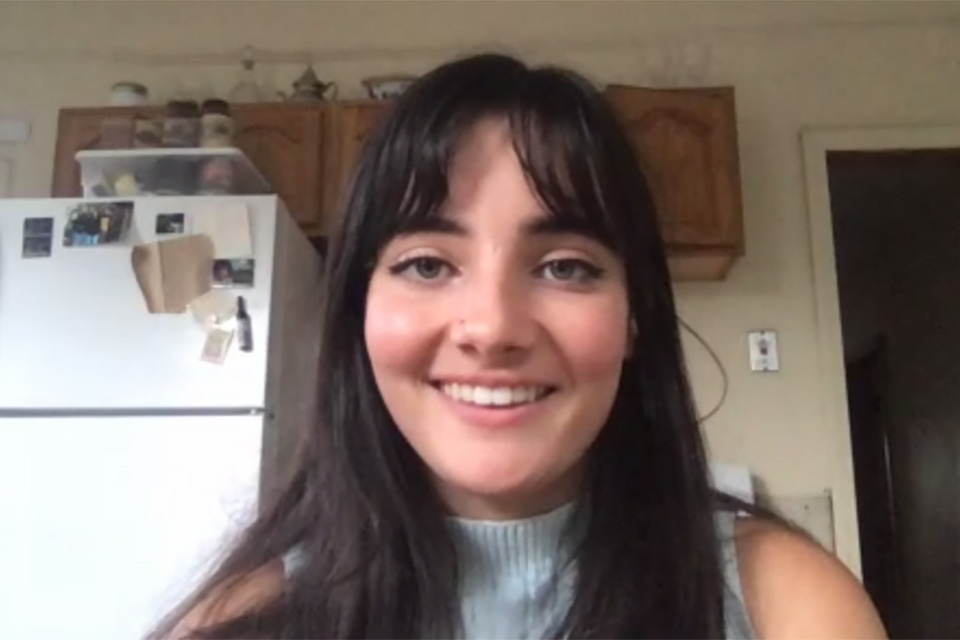Anna Kate Rattray '21
Nelson Lab, Department of Biology
Brandeis University

Fellow Reflection: Conducting Research During a Pandemic
The biggest challenge of maintaining safety in a lab atmosphere during a global pandemic is the fear of losing the collaborative atmosphere of academic research. Being able to chat with your lab mates, ask random questions, double check calculations, and learn more about the theory of your experiment without having to leave the lab bench is a privilege that I had unknowingly taken for granted before COVID-19. Before COVID, there was no prior planning or coordination required to ask your co-workers questions; now however, more formal emailing chains or group chats are becoming the norm. While it has been disappointing to lose some of the collaborative spirit and sense of togetherness that you get while working physically with one another, COVID has not made me feel alone in my research at all.
Because of COVID I and the rest of my lab have adapted to be able to reach out over text, facetime, and email. We have learned ways of virtually teaching each other experiments and techniques by filming or photographing our approach and sharing it with each other. Surprisingly, this method of teaching and collaboration has been a huge asset and bonus to learning during this time. Virtual teaching through videos and photos has the added benefit of permanence - if I missed a small detail during the first viewing I can replay the video or even follow along with it during my first try.
Conversely, if I was watching someone live and in person and I missed a detail I would have to ask them to take more time out of their schedule to show me again. In this way, virtual learning has allowed me to learn techniques I have never used before and continue to progress in the lab in ways I was worried I would be unable to.
Additionally, because I am often conducting experiments fully alone now, I have gotten better at checking myself during the experiment and explaining myself after. Through my time in undergraduate research I have learned that the most important skill I can develop as a young scientist is the ability to think critically about an experiment and explain it to others. COVID-19 has forced further development in this skillset. Due to the fact that all communication is now written or over zoom and I cannot show my mentors things in the lab as I normally would, I have gotten better at writing out my logic for an experiment, what I did exactly, and where I would like to go in the future with said experiment. This way, I have learned better ways of communicating my ideas and getting better feedback from my peers. COVID-19 is a challenge in so many ways, and there are certainly challenges to conducting research that are apart of it, but it has not been as much of a hardship as I was anticipating so for that I am grateful.
Giving Back
As we all know, COVID-19 has caused a tremendous shift in the way that we are able to approach education and learning. As school has gone online, young students have lost some of the ability to learn in a tactile fashion and gain experiential learning that impacts them in a way that zoom classes simply cannot. This summer, it has been an absolute joy of mine to teach a small group of young elementary students how to take learning and science into their own hands. Over zoom and prior planning with parents, I taught these kids the basics of the scientific method by overseeing a long term experiment where they observed plant growth in three different conditions. I remember conducting that experiment in 5th grade; the satisfaction I found from observing something in an organized way has no doubt impacted my life and career goals. It made me sad to realize that children might not be able to experience the same hands on lessons without the classroom setting.
Working with these kids to set up their experiments, keep them accountable for writing observations, and helping them design a results poster, I was taken back to a nostalgic part of my childhood and reminded of the joy and excitement that science can bring. Being able to watch them get excited about learning and adapt to a new style of school gave me a sense of relief that even though learning in COVID is so different than I’d hoped it would ever be, there is still a way to get excited and involved with a little more creativity and effort.